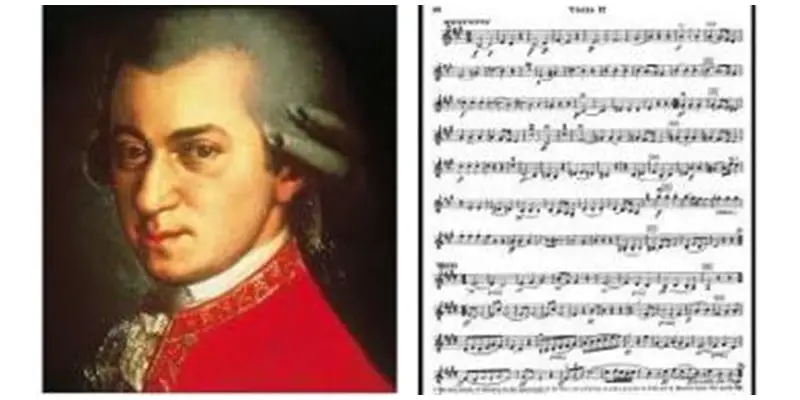
Mozart was one of the most prolific and influential composers of the Classical era. His works continue to be appreciated even today and forms a part of the study of many music curriculum.
In an age where electronic music, rock music & other contemporary forms of music is everywhere around us, it would seem that Mozart’s piano music might have faded into oblivion. Even if it has not, most feel that Mozart’s music is boring and some also think that its predictable.
However, the reality seems to be a bit different.
Mozart has done a phenomenal amount of work, as a composer, throughout his life. He had written his first symphony when he was just eight years old.
He was one of the most prolific composers of the Classical era and his works continue to be an integral part of the curriculum of many music courses even today. His music still continues to be used as background scores for many movies and television shows.
If you are interested in reading more about this child prodigy, who wrote his first symphony when he was just eight years old, here is a collection of the most popular Mozart books.
These books have a good balance between biographical and musical discussions, making them more useful as a musical reference after you’ve read it.
Many consider piano concertos to be the invention of Mozart. In his lifespan, Mozart wrote an impressive 27 concertos for piano and orchestra.
Several studies seem to suggest that Mozart’s music has a positive impact on the intellectual development of a child. You can read more on this topic here.
Also Read: Best of Mozart Music.
Most of us assume that Mozart had a lot of free time to compose these masterpieces. However, the fact is that Mozart did this for a living, and most of his works had to be delivered within a fixed time frame. Some of these Mozart concertos were written for his own subscription concerts, under extreme deadlines. He wrote most of these concertos, while trying to make a living, just like most musicians today (most of them don’t have lot of money).
Mozart’s Zenith
It can be said that Mozart’s glory days were from 1782 to 1785 when he was in fact very much in demand as a teacher, performer, and composer. He was able to make quite a handsome living from all his labors. Those were the times when both private and public concerts were quite popular. Mozart was the one of the leading spirits that pushed the genre forward into its prime. But, of course, not all good things last especially in the world of music. Everything went into quite a sharp decline in 1790 at the death of Emperor Joseph II. Other than the emperor’s death, recession and war also became contributing factors to the deterioration.
- Mozart Piano Sheet Music
- Mozart: Piano Sonatas
- Beethoven vs Mozart – Who Was the Greatest?
- Mozart Effect Explained
- Mozart Music for Meditation
Mozart Effect: Does listening to Mozart really boost brainpower?
Recently, at the very end of a performance by Boston-based Handel and Haydn Society (H+H Society), a little boy in the audience broke the silence with an awestruck “WOW!” after listening to Mozart’s Masonic Funeral Music. 9-year-old Ronan Mattin, who is on autism spectrum, did not mean to disrupt the event, but he often expresses himself in a different way to other people said his grandfather. The innocent “wow” seemed to win over the hearts of both the audience and the performers.
Mozart makes us feel that way, too! Help @handelandhaydn find this child: https://t.co/TsjEQmeSYX pic.twitter.com/FYpXmOT8hl
— 99.5 WCRB, Classical Radio Boston (@995WCRB) May 8, 2019
Back in the early 1990s, Dr. Gordon Shaw developed the Mozart Effect, a theory that suggests that listening to classical music can make you smarter, a theory that not every one agrees to though.
Shaw’s experiments showed that Mozart had lots of improvement on the brain; In 1993, he caught the media’s attention when he reported that a group of college students increased their IQs as much as nine points as a result of listening to Mozart’s “Sonata for Two Pianos in D Major.”
Mozart Effect is the notion that listening to music of the classical-era master, particularly Mozart’s sublime Sonata for Two Pianos, can boost brain power.
After this, several similar studies were conducted; one of which was conducted in Wisconsin that revealed that preschoolers given piano lessons once a week scored 34 percent higher on spatial reasoning tests than those who didn’t receive piano lessons.
That is when lot of people started believing in the Mozart effect – that classical music had a positive impact on the brain.
However, certain studies, like the one conducted by Harvard medical student Christopher Chabris, cast doubt on the Mozart Effect. Chabris study showed no statistically significant rise in IQ and no improvement in spatial thinking or abstract reasoning among the participants.
But what is it about Mozart that the brain responds to?
“One theory is that as Mozart started composing at age 4, he exploited the inherent spatial temporal firing patterns of the cortex, and hence his music resonates cortical structure,” says one research. Alternatively, the “repetition of the melodic line in Mozart’s music (may) reflect aspects of our brain and bodily function.”
Researchers are still conducting studies on the effect of music on the brain and even on people with certain illnesses like epilepsy.
As of now, it might be too early to answer if listening to your favorite Mozart CD will really make you a mastermind. Having said that, overexposure to Mozart is not going to harm you in any way. In fact, children will become more knowledgeable about music and will appreciate the works of the legendary composer.
Besides, periodic studies have provided evidence that Mozart’s music improves cognition in young and old alike. so go ahead and play your favorite Mozart track.
External Links
Mozart Myths Revisited
 Did Mozart transcribe Allegri’s Miserere after hearing it just once? Does listening to his music make you cleverer? Here, we rethink ten myths commonly associated with Mozart.
Did Mozart transcribe Allegri’s Miserere after hearing it just once? Does listening to his music make you cleverer? Here, we rethink ten myths commonly associated with Mozart.
1. He died in a pauper’s grave
Mozart was buried in an unmarked ‘simple’ grave (not a communal pit), which was standard for Vienna’s middle class at that time. The poor were buried in sacks whereas Mozart probably wore a black suit. He was buried in a coffin bought by his wife Constanze and patron Gottfried van Swieten.
2. He had Tourette’s Syndrome
In 1992 the British Medical Journal claimed that Mozart’s mannerisms and his scatological letters showed he had Tourette’s. But his bums-and-poo humour was evidence of high spirits and was common in middle-class Vienna.
3. He died rehearsing the Requiem
In the decades after his death, the new Romantic ideas of composer-as-tortured-artist embroidered the story of the Requiem’s composition. But the day-of-death rehearsal with friends, and his sobbing during the Lacrimosa, is fanciful: the last sing-through happened earlier.
4. Salieri poisoned him
As early as Dec 1791, the rumour was circulating that Antonio Salieri poisoned Mozart. Alexander Pushkin wrote a play about it and as late as 1984, the film Amadeus was made based on the idea. But Constanze didn’t think so, even though she said the dying, delirious Mozart mentioned it.
5. He wrote Symphonies Nos 39-41 as testament, for posterity
There’s no firm evidence he heard them played. But he didn’t write them for posterity: he was a pro, not an egotist. He undoubtedly wrote them for commercial performance, but was probably stymied by Vienna’s 1788 recession.
6. As a teen he wrote out Allegri’s Miserere after one hearing
Remembering and transcribing the layout of this formulaic piece was within his powers, but no Mozart manuscript of the Miserere is known. The only references are his dad’s vague letter at the time, and his sister’s recollections 20 years later.
7. He constructed a system for generating minuets by throwing dice
A portion of his String Quintet, K516f manuscript has music fragments possibly associated with the alphabet – but no instructions on how to ‘convert’ names to melodies, and nothing about dice.
8. He wore brightly coloured wigs
Not only did Mozart never wear the party-joke hairpieces featured in the film Amadeus – he rarely wore a wig (only for official occasions). What you see in those portraits is his own fair hair, dressed and beribboned, as society men did then.
9. Mozart increases your intelligence
Rauscher, Shaw and Ky (1993) reported that hearing ten minutes of Mozart’s Sonata K448 temporariy increased IQ scores, compared to silence, something that came to be known as ‘The Mozart Effect’. But nobody else has replicated this – they’ve only concluded that it’s an effect of mood.
10. A photograph of Constanze Mozart was taken in 1840
An old lady seen standing in a group photo taken at the house of composer Max Keller is rumored to be Mozart’s widow, Constanze. It is almost certainly not her – the lenses needed for such outdoor group shots were not pioneered until after her death in 1842.
Words: Rob Ainsley
Tom Service’s The Joy of Mozart is on BBC Four on Sunday 18 January, 9pm. Visit: bbc.co.uk for further information
Mozart Products
KeytarHQ editorial team includes musicians who write and review products for pianists, keyboardists, guitarists & other musicians. KeytarHQ is the best online resource for information on keyboards, pianos, synths, keytars, guitars and music gear for musicians of all abilities, ages and interests.



Leave a Reply